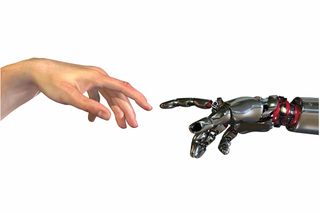Scientists edge closer to smarter robots
Boffins at the University of Edinburgh and University of Sheffield are working on how to give robots the human touch.

Research into how human brains interpret our senses could pave the way for robots whose fingertips are as as sensitive our own.
If the study, carried out by teams at Edinburgh and University of Sheffield universities, continues to be successful, it could pave the way for mammoth developments in the areas of prosthetic limbs or work in high-danger environments like bomb disposal.
Boffins at the institutions are using artificial mouse whiskers, connected to a robotic brain, to try and analyse how our brain processes what we feel when we touch things. In doing so, they have been able to mirror how the brain interprets whisker movement based on direction and build associated profiles that will enhance future robot design.
"The next generation of robots will learn from experience just as we do," said Professor Tony Prescott, of the University of Sheffield's Department of Psychology, in a statement. "This study is helping us to understand how the brain learns, without a teacher, to extract useful information from sensory signals."
The teams now hope to expand the scope of their research to cover how the brain understands the different shapes of objects it encounters.
Click here for our feature on the future of robotics.
Get the ITPro. daily newsletter
Receive our latest news, industry updates, featured resources and more. Sign up today to receive our FREE report on AI cyber crime & security - newly updated for 2024.
Maggie has been a journalist since 1999, starting her career as an editorial assistant on then-weekly magazine Computing, before working her way up to senior reporter level. In 2006, just weeks before ITPro was launched, Maggie joined Dennis Publishing as a reporter. Having worked her way up to editor of ITPro, she was appointed group editor of CloudPro and ITPro in April 2012. She became the editorial director and took responsibility for ChannelPro, in 2016.
Her areas of particular interest, aside from cloud, include management and C-level issues, the business value of technology, green and environmental issues and careers to name but a few.
Most Popular






